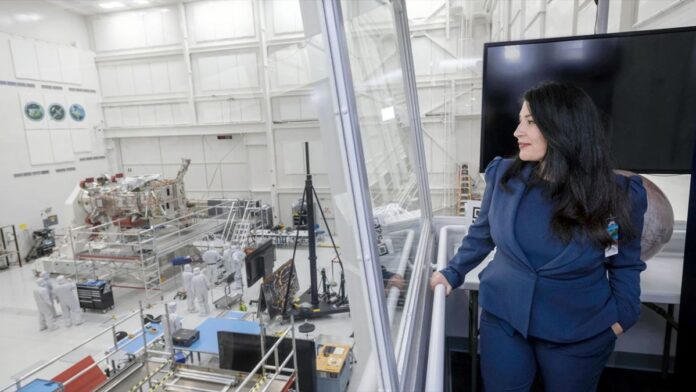“It is not darkness that unites us, not the cold distance of space, but the offering of water…”
Those words, written by U.S. Poet Laureate Ada Limón, are part of an ode that will fly on a robotic probe to a distant icy moon. Now, with the poem’s reveal, the Library of Congress is inviting the public to add their names to Limón’s tribute, like a message in a bottle from Earth to the Jupiter moon Europa.
Names submitted to the “Message in a Bottle” website before the end of the year will be stenciled onto a microchip to accompany Limón’s verse, which she titled “In Praise of Mystery: A Poem for Europa.”
Related: Behold! Our closest view of Jupiter’s ocean moon Europa in 22 years
“Writing this poem was one of the greatest honors of my life, but also one of the most difficult tasks I’ve ever been assigned,” Limón said in a statement released by the Library of Congress. “Eventually, what made the poem come together was realizing that in pointing toward other planets, stars and moons, we are also recognizing the enormous gift that is our planet Earth. To point outward is also to point inward.”
The space-bound poem was first shared publicly on Thursday (June 1) during a special reading at the Library of Congress in Washington, D.C.. NASA’s Europa Clipper is targeted to launch in October 2024 from Cape Canaveral, Florida, on a 1.8-billion-mile (2.6-billion-kilometer) journey to the smallest of Jupiter’s Galilean moons.
Arriving in 2030, the spacecraft will orbit Jupiter and fly by Europa about 50 times as it gathers data on the moon’s subsurface ocean, ice crust and atmosphere. The mission will investigate whether the conditions on Europa can support life.
“O second moon, we, too, are made of water, of vast and beckoning seas. We, too, are made of wonders, of great and ordinary loves, of small invisible worlds, of a need to call out through the dark,” reads Limón’s poem.
“In Praise of Mystery: A Poem for Europa” will be engraved — in the Poet Laureate’s own handwriting — on the inward-facing side of a tantalum metal plate. The triangular piece will then be mounted on the side of the Europa Clipper spacecraft, where it will serve as a seal to an aluminum-zinc alloy vault shielding the spacecraft’s radiation-sensitive electronics.

A collaboration between Limón and the Library of Congress, the “Message in a Bottle” campaign is similar to other NASA projects that have enabled tens of millions people to send their names on flights to the moon, Mars and beyond. The flight of the poem also continues a tradition of sending inspirational messages on interplanetary probes, such as the Pioneer plaques and the “Golden Records” on the two Voyagers, which were engraved with images meant to communicate that life existed back on Earth.
“Sending a poem into space on a mission to explore our solar system is an incredible opportunity for us all,” said Carla Hayden, Librarian of Congress. “Ada Limón is a brilliant poet whose work often connects readers with the natural world, so her ‘Poem for Europa’ is powerful in communicating our human instincts for art, science and exploration.”
Prior to writing “In Praise of Mystery,” Limón visited the Jet Propulsion Laboratory in Pasadena, California, to see Europa Clipper and learn more about the mission from those who will operate the probe. Limón was recently reappointed to serve a two-year second term as U.S. Poet Laureate through April 2025.

Limón is not the first Poet Laureate to be inspired by a NASA mission or even the first to send an original composition into space.
Howard Nemerov, during his second term in service to the Librarian of Congress (1988-1990), wrote a poem upon “Witnessing the Launch of the Shuttle Atlantis,” and four Poet Laureates — Billy Collins (2001 2003), Rita Dove (1993 1995), Juan Felipe Herrera (2015 2017) and Charles Simic (2007 2008) — contributed messages to the plaque that launched with NASA’s Lucy spacecraft in 2021 on a mission to multiple asteroids.
Follow collectSPACE.com on Facebook and on Twitter at @collectSPACE. Copyright 2023 collectSPACE.com. All rights reserved.

